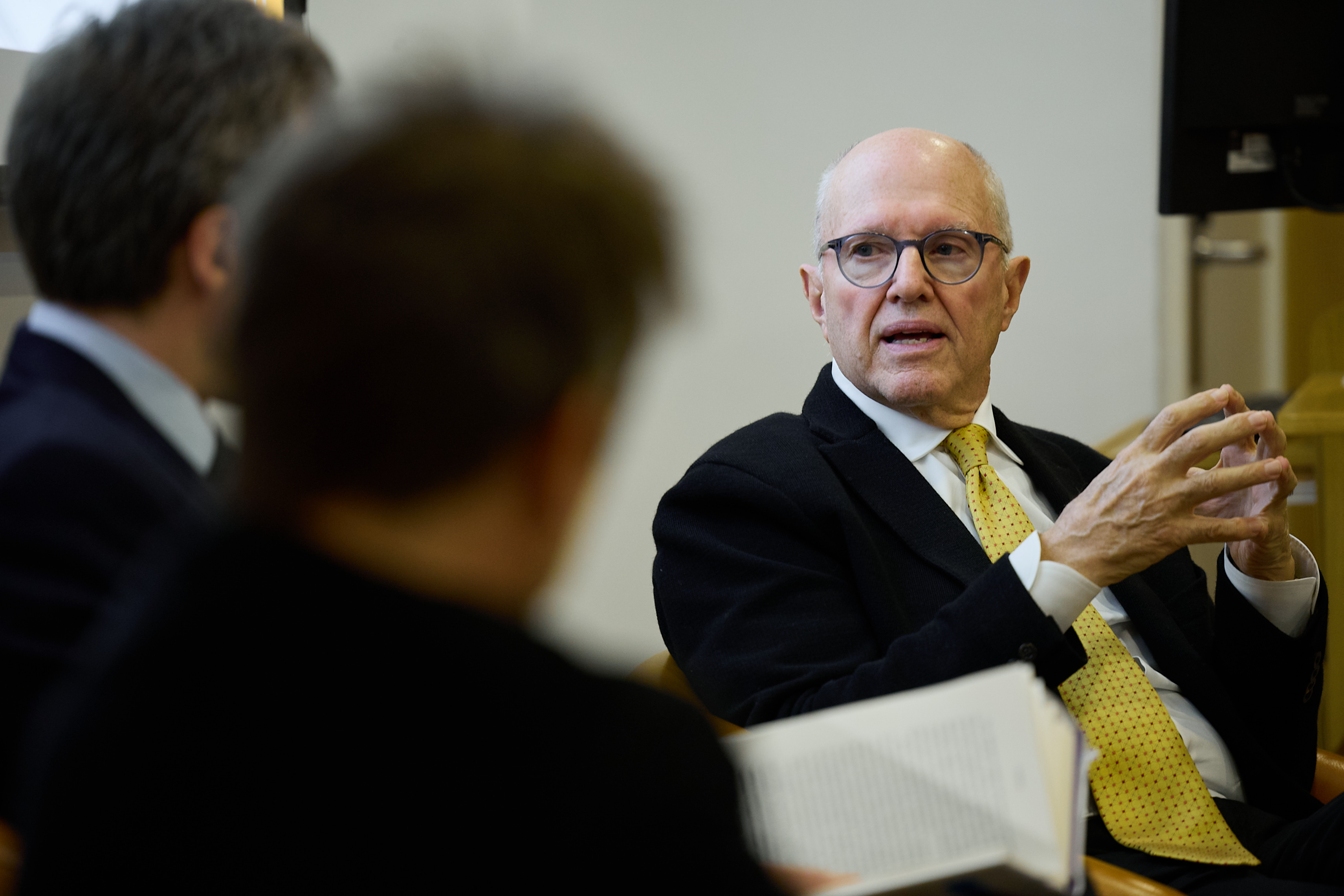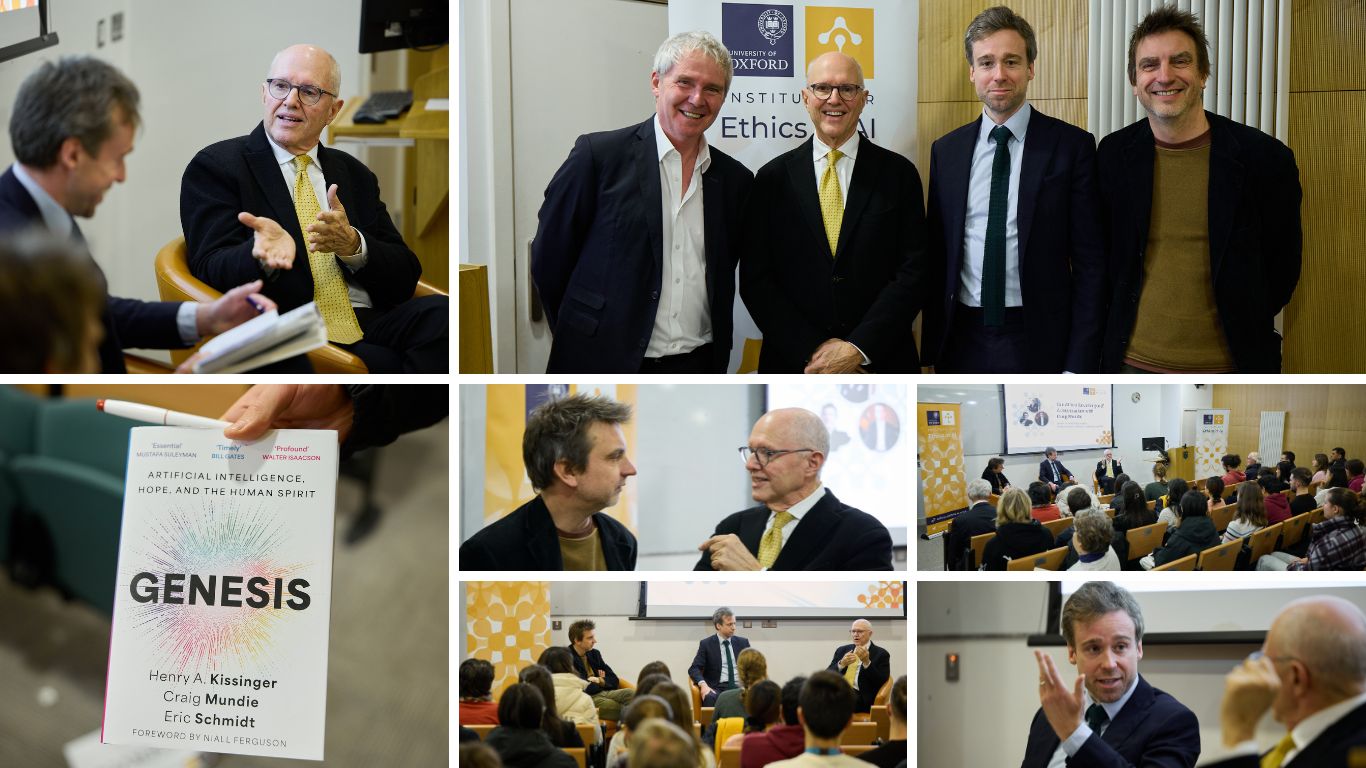
Write-up by Benjamin Lang, Doctoral Candidate and Affiliated Student at the Institute for Ethics in AI.
On Wednesday 29 January, the Institute welcomed Craig Mundie at Ethics in AI Colloquium: Can AI Be a Force for Good? A Conversation with Craig Mundie, hosted by the Director of HAI Lab, Professor Philipp Koralus. The event discussed themes in Mundie's recent book co-authored with Eric Schmidt and the late Henry Kissenger: Genesis: Artificial Intelligence, Hope, and the Human Spirit.
Craig Mundie is a distinguished technology executive with significant contributions to the tech industry and public policy, focusing on advising organisations and governments on emerging technologies such as fusion energy, controlling superintelligent systems, cybersecurity, quantum computation, and molecular medicine. During his 22-year tenure at Microsoft, he held key leadership roles, including Chief Technical Officer, Chief Research and Strategy Officer, and Senior Advisor to the CEO, shaping the company’s technology strategy and research initiatives. Additionally, Mundie has been a trusted advisor to the U.S. government, serving on the National Security Telecommunications Advisory Committee and President Obama’s Council of Advisors on Science and Technology, where he influenced national science and technology policies.
Mundie's presentation was followed by comments from Professor Christopher Summerfield. In his talk, Mundie asserted we “could afford to be soberly optimistic” about the advent of AI technology which far surpassed human intelligence so long as we succeeded in establishing a proper “architecture of trust.”
Mundie began by outlining key components of his proposed architecture of trust:
a technical strategy
a legal strategy
international adjudication
policy changes which supported and legitimised the adjudication
geopolitical analysis
enforced non-proliferation
Putting this architecture of trust into practice would require the compliance of both private companies as well as various governments, and Mundie suggested the use of AI-piloted adjudication to mitigate its own risks, given concerns over the Control and Alignment problems. Despite this international cooperation and subordination to an adjudicatory body, Mundie insisted on the need for harnessing rather than curtailing the competitive nature of AI development for those on the frontier. In his estimation, attitudes and public perception toward AI thus far have been “over-indexed to the downsides,” leading to reactionary and overreaching regulatory strategies.
In his initial remarks, Prof Summerfield pushed back against the presumption of near-future AI which greatly exceeded human intelligence. How, Prof Summerfield posed, do we get from ChatGPT, effectively a souped-up predictive texter, to artificial general intelligence capable of revolutionising human enterprise? Summerfield also discussed historical trends in AI development wherein robustness lagged behind growth in brute power, leading to a predictable “catch-up” period. Summerfield pondered aloud what adverse impacts there might be in the catch-up period of a superintelligent AI, even if we succeed in putting an architectural trust in place. Finally, Prof Summerfield discussed the humanness of our social order—of how our norms, our relationships, and our conscience—find roots in our underlying humanity. How could we safely convey or instruct rule-following AI to abide our values if it lacked the kinds of senses or instincts by which we ourselves apprehend such values?
In response, Mundie resisted the premise that ChatGPT was as incapable as commonly supposed, citing how some language models are already adept at providing accurate medical diagnosis from only limited prompts about users’ symptoms. Moreover, oftentimes, complaints about AI failings follow a double standard where humans are permitted to err at fairly high rates (e.g., driving), while the AI is held to a standard of infallibility. In response to the question posed about humanness and value, Mundie suggested anchoring AI constraints in the anthropological concept of “doxa,” a posited series of fundamental, cross-cultural, internalized, and ineffable presuppositions societies rely on to function.
In his contributions, Prof Koralus focused on comments Mundie made about open-source approaches and favouring an AI singleton which could incorporate the collective wisdom and values of the masses. Prof Koralus noted that decentralisation and individual autonomy were essential for collective intelligence, as it arises only through numerous agents dynamically interacting and adapting to their environment. Accordingly, a philosopher-singleton may prove less optimal than supposed, and we would be better off instead creating a legion of philosopher-citizens with personalized AI advisors in their pockets, especially if users trusted their personalized AI over a singleton.
In reply, Mundie admitted that an open-source model had a place in his vision for AI development, but that some form of policing would be necessary in the form of technical controls. He also acknowledged that, given an architecture of trust would accommodate many competing AI developers, it was unlikely that just one philosopher king AI would emerge without rivals.
The discussion highlighted some of the conceptual and pragmatic challenges for guiding future AI development in a safe and responsible direction, as well as what presuppositions we take on board when making claims about which collective strategies best balance competing interests.
The event in photos

